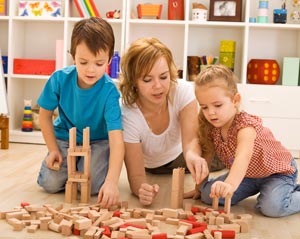If you ever wake up and think, “Gosh, I just love how as a parent, society gives me no respect, gratitude, or support.” And you wonder, “How can I get more of the same?” Well, you might decide to go into early childhood education! Should you decide to get an advanced degree—since, as we know, you are in it for the money—you will undoubtedly come across the name of Lev Vygotsky. He was an educational psychologist primarily interested in how children learn and develop and how society can influence and enhance a child’s cognitive and social development.
I first learned about him in my master’s program, and we dissected his methods frequently at Stanford. His concept of the Zone of Proximal Development, or ZPD, is much revered and applied in today’s cognitive psychology and education fields. By now, you know that you already are a teacher—your child’s first. Well, then, let’s take a look at how we, as parents, can support our children’s learning and development by applying Vygotsky’s ZPD.
Observation
The process of applying the ZPD begins with observation. What better gift could you give your children than your undivided attention? It’s cheaper than anything at ToysRus, and doesn’t take 20 minutes to unpackage.
When you see your children struggling with any task, before you jump right in to fix it, fight that natural urge and take a moment to observe and assess the situation. Try to determine the exact point or concept that they are struggling with. You’ll be teaching them some patience (great for young children to practice this virtue) and encouraging them to learn to fix things for themselves—or to ask for help nicely. (We all need somebody to lean on.)
Scaffolding
Once you’ve determined what exactly has your children perplexed, it’s time to gently lift them to a higher ground of understanding. You do this carefully by asking them thoughtful questions that lead them to discover their own answers. Don’t be afraid. You won’t hear a loud BUZZ if you ask the wrong question and nothing you ask will stunt their growth.
You will get the hang of it the more you try. Begin by articulating your assessment in a casual yet specific manner: “I see you are having trouble fitting that yellow piece into the puzzle.” Then ask a question that will help lead to a solution: “Does the outline of its shape match the shape you are trying to put it in?” With little ones, you are commonly breaking down steps of processes that we have internalized and now assume to be understood by all.
Even Vygotsky would agree that young children learn by doing. We can help them by asking delicate questions that lead them to cognitive breakthroughs and personal discoveries. This is the essence of what Vygotsky termed “scaffolding.”
Your Whole Child
Keep in mind that as parents, the application of the ZPD is not exclusively limited to cognitive development. As your children grow from babies to toddlers to young children and so on, they will encounter challenges in all aspects of development. You’ll want to be there to listen and support.
All of the lab schools I taught at focus on the development of the whole child, and we should, too. After all, there’s more to life than the A-B-C’s and the 1-2-3”²s. When your children encounter a social dilemma, ask them if they think there is something they can say to fix it or make the other party feel better. Trouble climbing the ladder at the playground? Ask them if there is somewhere else they can put their hands on. No matter the challenge, each time you scaffold them to the next step with a careful question, you are enhancing their emotional development, independence, and self-esteem.
Often with little ones, our first task will be to encourage them just to slow and calm down. The best way for a parent to do that is by articulating our belief in our children (much more effective than screaming “Calm down!”). In both scaffolding and parenting, it’s all about creating a dialogue and a trusting relationship. Once they relax, they will be more willing and able to answer your questions, inviting them to think more deeply. Soon, the questions will be internalized as structures for finding solutions in all aspects of their lives.
Learning as We Go
Continue observing and scaffolding your children’s development and you will find that you, too, are learning along the way. As an added bonus, you might also find yourself enjoying your roles as parent and teacher more. While it’s not all fun and games, it is gratifying to witness and support your children’s development. Now you know why some people choose to become teachers. I’m going to thank my child’s teachers the next time I see them
P.S.- Anytime you obtain a “formula” for parenting from any source, be mindful that you do not apply it the same way, verbatim, every time. This will be ineffective for two reasons: (1) Your child will become aware that you are playing a script and (2) You will be annoying. Just be yourself. Think less robot/computer/scientist and more parent/teacher/human. Enjoy your children!

